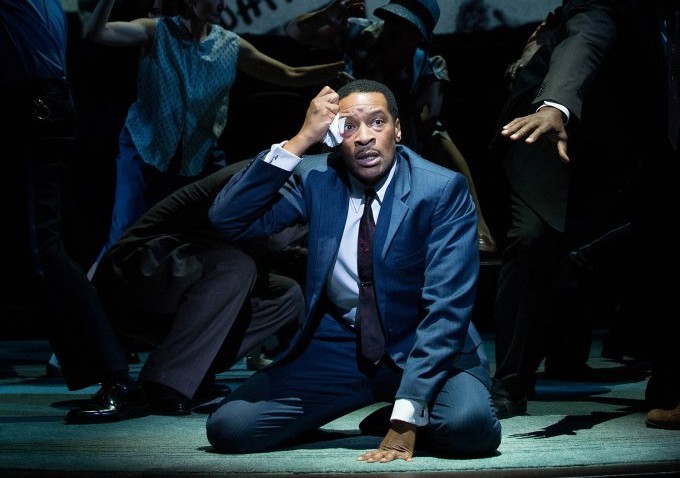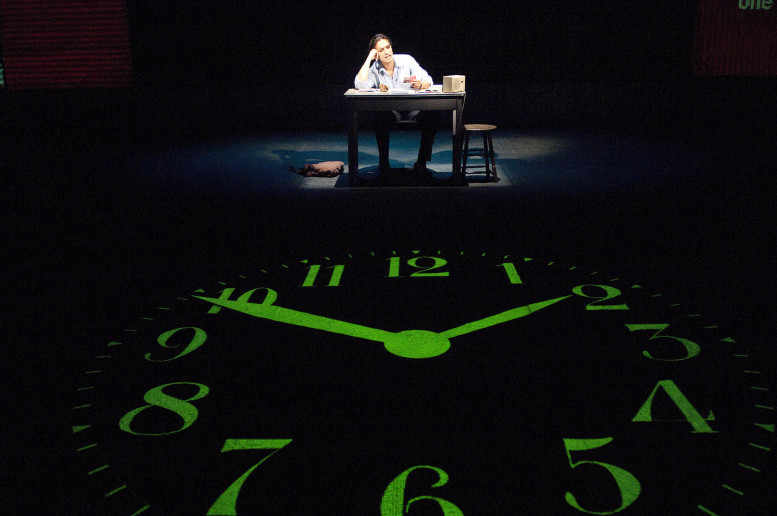Extended Play’s Hailey Bachrach recently sat down with Julie Felise Dubiner, the associate director of the Oregon Shakespeare Festival’s American Revolutions: The United States History Cycle, which seeks to commission 37 new plays by American playwrights highlighting moments of change in our country’s history. Now entering its final year of commissions, plays produced by the cycle have included Tony-winner “All The Way” and its sequel “The Great Society,” as well as Lynn Nottage’s “Sweat” and UNIVERSES’ “Party People,” both of which will be appearing at the Public Theater this season.

HAILEY BACHRACH: I’m sure you’ve had to do this a hundred times, but could you summarize the American Revolutions project in your own words?
JULIE FELISE DUBINER: What we’re doing is a ten year — the first part of the program, I should say, ’cause we’re about to end the first part of the program — was ten years of commissioning 37 plays about moments of change in American history. And we’re just about to announce the ninth class, so next year will be the last year of the commissioning part of the program and then the rest of the time will be developing these plays. Basically, all we do is we give the writers that prompt, and then from there they follow their passion.
We did have one year where we did three — we never actually came up with a name for it, but I’ve been calling them focused commissions. Where Alison Carey, who’s the director of the program — she and I have a big board in my office with everybody who’s working on the program, and we were looking at it, we were about halfway through, and we were like, “Okay well what, if this is missing, what will make us feel like we didn’t actually complete this project?” We came up with three things that we felt we needed to give a nudge on.
One was, we commissioned Dominique Morriseau with Penumbra Theater in St Paul. Ta-Nehisi Coates wrote an essay about 2010 or 2011 called “Why Do So Few Blacks Study the Civil War?” And at the time, a lot of people were talking about the 150th anniversary of the Civil War, and we commissioned Dominique not necessarily to adapt that essay but to use that essay as a leaping-off point. So she, when she writes, will be writing something about the experience of black people during the Civil War.
And then, it was also shortly after — so this was 2013 I guess — so it was right after Newtown and I was kind of losing my mind, you know, like so many other people, and so we commissioned Dan O’Brien to write a history of guns in America.
And then the last one, Alison in particular, is a very committed environmentalist, and I think any sane human being is concerned about climate change. And so we felt like we didn’t have anyone writing specifically about the natural environment, so we opened that up to a proposal system, which we’d never done before. And we got about 35 proposals, and we chose Idris Goodwin’s. He discovered these logbooks from the Department of War, and the Department of War had sent out all these teams to survey the country before it was even really the country. To figure out where to put the railroads. So they sent teams of artists and scientists and soldiers out to decide basically what to destroy in order to create great progress. And so he’s in the process of writing that. All of the others have been chosen really very subjectively. We choose based on body of work, and I read three or four hundred plays a year, sometimes more, sometimes less, just scouting, scouting, scouting, scouting, scouting to see who might have something interesting to say about American history.
HAILEY: You addressed this a little bit, but can you talk about what the impulse behind this project was?
JULIE: Sure. I wasn’t here yet, but the story as it’s been told to me is, when Bill Rauch was up here interviewing and hoping to become the artistic director of OSF, he was asked to propose a project, and he realized as he was looking around a theater that’s so committed to Shakespeare that Shakespeare had written the history of his people onstage.
And that all those history plays — we didn’t have anything like that in our history, and so why not? And so after he got the job, he brought in Alison Carey, and Alison set about figuring out what would this program look like. Bill’s original idea had been to do a play for every president, or every presidency, and then after a lot of consultation with artists and historians and just general great thinkers — including Alison, who’s one of the great thinkers of our time — they realized that they did want to come up with something that was more of a push than a prescription. Which I guess I’ve already said, but the idea of a moment of change in American history to me is just so brilliant, because it gives that writer that freedom to tell whichever story they’re drawn to, but it also implies action and dramatic structure — all those things that as a dramaturg, I love.
By 2010 they had the first play up, which was “American Nights,” by Richard Montoya and Culture Clash, and that set this great tone of — it’s really fun. I don’t know if you read it or if you got to see but the basic story is it’s a young Mexican man studying for his American citizenship test. And he falls asleep and he has this crazy fever dream with basically all of American history and it’s wild and it’s raucous and it’s fun, and to everyone’s — I don’t think it was a surprise, but I’m sure it was a sense of relief — it sold like gangbusters.
HAILEY: You mentioned that when Bill Rauch was conceiving of this program, part of his thought was that these history plays don’t really exist in American culture. But it seems like in the past couple years, suddenly the history play is in vogue again. What do you think about that? Is that something you guys talk about over there?
JULIE: I do think that we are living in such a tumultuous time that it is making people ask questions about who we are as a people. And I think you look at, especially from our program, so many plays from the ‘60s and ‘70s and early ‘80s — you sort of realize that we’re still reckoning with what the heck happened there. And I think we’ve had such profoundly large, consequential elections — I mean not that they aren’t all, but I think that first election of Barack Obama was so profound, and also surfaced so much nastiness in the country as well — it’s like a weird mix of joy and weird and nastiness. And I looking at the election coming up, it makes any considerate person, which I think most artists are, sit back and go, “What the hell is going on?”
And I like to think that our program has also had an impact on that. ‘Cause when a play like “American Nights” sells so well and does so well and is so enjoyed and is so smart, that sort of propels people — and not necessarily the writers, because I think the writers have always been taking chances, but I think it propels the theater leaders, the artistic directors, to program plays like that. For me, one of the biggest weird changes of going from a more traditional regional theater to OSF was I had gotten very used to five characters being a large cast. And now I’m at OSF where five people is tiny! We need a play for 19 people. It’s not just the cynical, “Let’s employ more people,” it’s actually “Let’s tell a bigger story.” And I think as someone who’s been working in literary offices for 20-something years already, I had gotten really discouraged at how small the plays were getting. There’s like a whole genre thereof like three people sitting around somebody’s living room complaining about something. And some of them are brilliant plays, don’t get me wrong, and some of the dialogue is just so sparkly and crackly, but a lot of them also just didn’t rise to the level of metaphor. And I saw a lot of playwrights coming out of playwriting programs who had sort of been taught to write small plays so that they would get produced. And so I think starting with “American Nights,” and then all of our plays have gone on to second productions, which was also something that the American theater had really been struggling with. And then you follow that trajectory to “All the Way.” And “Hamilton” is not ours, but I think “Hamilton” too, obviously. There’s definitely something that’s very encouraging to people, to see something that big all of a sudden be so loved and so good and so loved for being so good.
HAILEY: You said a few minutes ago that you had certain topics, like climate change and gun control, that you specifically wanted people to respond to. Why do you think asking someone to write a historical play on contemporary issues is an important and useful thing to do?
JULIE: I don’t actually think of them as contemporary issues, I think of them as things are culminating now, or we’re in the middle of now, but they didn’t start now. Part of why I’ve always loved studying history is there’s that sense of, if you study where you came from, then you can figure out where you’re going. Idris’s play is a great example of, you look at this moment in time that is a moment of profound destruction for communities as well as for nature, but it’s also a time of great progress. And then you also see the birth of the coal industry, and how people get rich off of that, and then stop progress. With gun control too — I have no idea what Dan’s gonna be writing about, he hasn’t started yet, but we had that crazy incident up here in Oregon last year with the nature preserve and the militia up there — in addition to shootings at Roseburg and yet another one this morning in Florida and Orlando and Newtown and all these big shootings, you also have this militia guy. And there’s a straight line from the second amendment to there. Back when they were designing the program there was also a moment of, maybe we would have plays for every amendment to the constitution.
But the idea that any play that’s written in history is actually about the present tense is something that is always clear to us. Arthur Miller can write about witch trials, but they’re not really the witch trials. I think, striving towards metaphor again, making the play bigger — I think choosing a historical topic opens you up to investigate something about where we are now by looking at where we were then.
HAILEY: It sounds like, in your view, this is a way of sort of re-expanding, maybe, the American theater itself.
JULIE: I think so. With “All The Way” we saw the same thing — it was a limited run, but they sold every single ticket to that show. People are willing to go see big stories, they want the big. It’s a crisis that we’re in right now, right, where tickets are expensive and nobody wants to go, but they’ll go for a big show. And then it’s on us to figure out how to make sure that it becomes available to more people. Or as much as we can. You know, with “Angels in America,” the $20 ticket, with “Hamilton” the lottery, and OSF has all kinds of ticket deals and all kinds of audience development initiatives — when you have the success, you can sort of double back and try to implement correctives.
HAILEY: And it seems to me that that sense of participation is part of what’s driving this new spate of history plays as well.
JULIE: Yes. And at OSF, diversity and inclusion are literally our core principles. And I love that, I find it such an expansive place to be. If you look at the people we have commissioned so far, we’re going for diversity on every level, not just what color skin somebody has, or where their families came from, but also diversity of style. One of my favorite years so far was the year that “Party People” by UNIVERSES was playing at the same time as “All The Way,” and not only were the two things in conversation because they were touching on similar points in history, but it couldn’t’ve been two more different ways of telling a story, and they were both coming from the same program, both being produced by the same theater, and both achieving lasting success, which is thrilling.
I’m just so sad that this first phase is coming to a close. It’s something I’m really proud to have been a part of, to bring plays into the world and to see them busting records wherever they play. It’s really totally, totally thrilling.
Authors
-

-

Julie Felise Dubiner is the Associate Director of American Revolutions: the United States History Cycle. At OSF, Julie has served as dramaturg for "The Wiz," "Sweat," "The Cocoanuts," "The Liquid Plain," and "Party People." At Actors Theatre of Louisville, she collaborated on more than 40 productions and projects in the regular season and the Humana Festival, and co-created "Rock & Roll: The Reunion Tour." In Philadelphia, she was project manager of the musical "The Rosenbach Company" and dramaturg at the Prince Music Theater. In Chicago, Julie freelanced with Defiant Theatre, blue star performance company, Steppenwolf Theatre Company and others. She has been a guest dramaturg at the Kennedy Center and KCACTF, the O’Neill Playwrights Conference, the New Harmony Project and elsewhere. Julie is the co-editor of two anthologies of Humana Festival plays; co-author of 'The Process of Dramaturgy: A Practical Guide;" and a contributor to "The Routledge Companion to Dramaturgy; Innovation in Five Acts: Strategies for Theatre and Performance;" HowlRound; the LMDA Source Book; and is a Kilroys nominator. Julie holds a BA from Tufts University and an MFA from Columbia University.
View all posts









